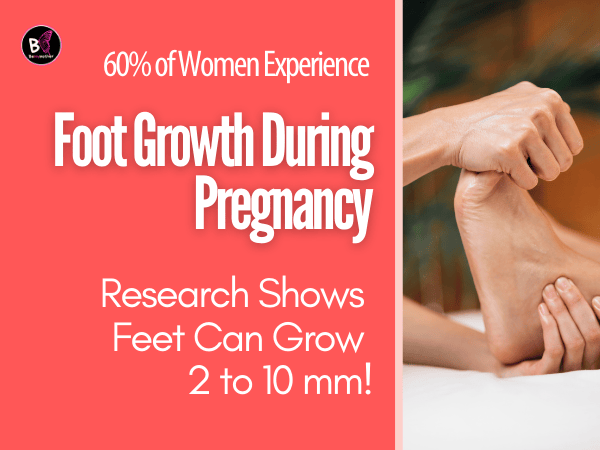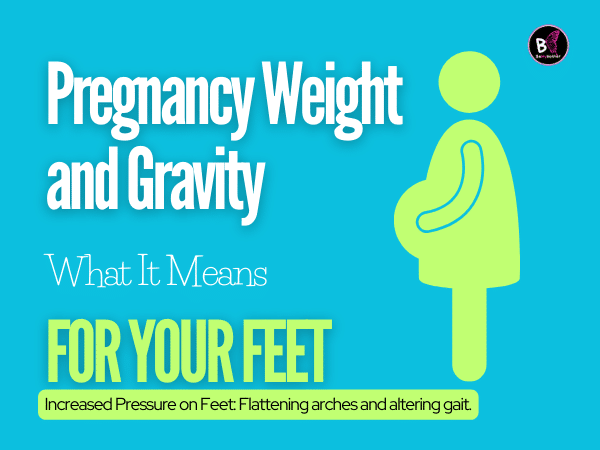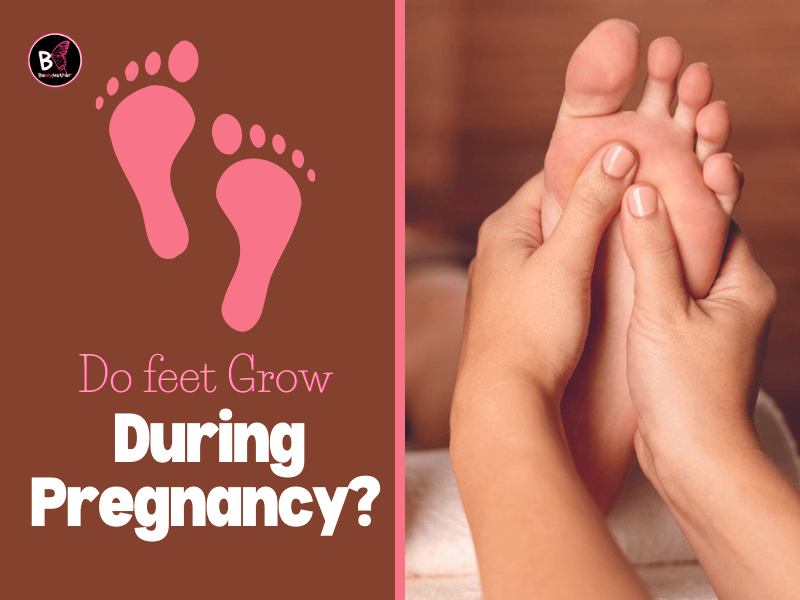Pregnancy is a miraculous journey filled with countless changes—both seen and unseen. However, one of the most surprising transformations many women experience is in their feet. Yes, “Do feet grow during pregnancy?” is a fundamental question with science-backed answers. Whether it’s hormonal shifts, weight gain, or swelling, pregnancy can alter your foot size and shape, sometimes permanently.
This article explores everything you need about pregnancy-related foot changes, supported by research, expert advice, and actionable tips. From the science behind foot growth to strategies for staying comfortable, let’s walk you through this fascinating aspect of motherhood.
1. Do Feet Grow During Pregnancy? Understanding the Science Behind the Phenomenon
Pregnancy-related foot growth isn’t a myth—it’s a well-documented phenomenon. According to a study from the University of Iowa, 60–70% of women experience a permanent increase in foot length and width during pregnancy, with foot length increasing by 2 to 10 millimeters.
But what’s behind this change? The answer lies in hormonal and biomechanical factors:
- Relaxin Hormone: Increases ligament laxity, causing the arches to flatten.
- Weight Gain: Adds pressure to the feet, altering their structure over time.
- Swelling (Edema): Temporary swelling can lead to a size increase.
💡 Related Article: Learn how body changes affect physical activities in Planks During Pregnancy: 10 Expert Tips for Safe and Effective Workouts.

2. What Causes Mom Feet? Key Factors Behind Permanent Foot Changes
“Mom feet” refers to the often permanent changes in a woman’s foot size and shape after pregnancy. Several factors contribute to this:
- Hormonal Changes: Elevated relaxin levels soften the ligaments in your feet.
- Weight Gain: Added stress flattens the arches.
- Fluid Retention: Temporary swelling can sometimes result in long-term changes.
🔍 Research Insight: A study from the American Journal of Physical Medicine & Rehabilitation found that nearly 60% of women reported permanent foot changes postpartum.
3. The Effects of Pregnancy Hormones on Foot Size and Shape
Pregnancy hormones such as relaxin and progesterone are crucial in loosening ligaments throughout the body. This ligament laxity is essential for childbirth but has unintended consequences for your feet:
- Flattened Arches: The lack of support leads to longer and wider feet.
- Loss of Arch Height: A study highlighted a significant decrease in arch rigidity during pregnancy.
Understanding these hormonal effects can help you choose proper footwear and maintain foot health during pregnancy.
🔍 Research Insight: A study published on PubMed highlighted that ligament laxity, influenced by hormonal changes like increased relaxin during pregnancy, remained consistent in the second half of pregnancy and reduced by 14% four months postpartum, indicating partial reversibility.
4. The Role of Swelling (Edema) in Foot Growth During Pregnancy
Swelling, or edema, is a common pregnancy symptom caused by increased blood flow and fluid retention. While temporary, swelling can:
- Increase foot size.
- Cause discomfort or tightness in shoes.
- Worsen with prolonged standing or heat.
Table 1: Tips to Manage Swelling During Pregnancy
| Tip | Action |
| Elevate Feet | Rest with feet elevated above heart level. |
| Compression Socks | Wear to reduce fluid buildup. |
| Stay Hydrated | Drinking water helps reduce swelling. |
💡 Related Article: Are you curious about other pregnancy-related changes? Explore Tailbone Hurting During Pregnancy? 9 Must-Know Facts and Expert Tips.
5. How Changes in Weight and Center of Gravity Impact Your Feet

As your baby grows, so does your weight—and your center of gravity shifts. This leads to:
- Increased Pressure on Feet: Flattening arches and altering gait.
- Postural Changes: Straining the feet and lower back.
Wearing supportive shoes and incorporating gentle exercises can mitigate these effects.
💡 Related Article: Experiencing aching, swollen feet during pregnancy? Understanding how your feet change can help you find relief. Discover expert-backed solutions in How to Relieve Foot Pain During Pregnancy? 9 Proven Tips Every Mom-to-Be Should Know to stay comfortable and supported throughout your journey.
6. Can You Prevent Feet from Growing During Pregnancy? Practical Tips and Strategies
While you can’t completely prevent foot growth during pregnancy, you can minimize its effects:
- Choose Supportive Footwear: Opt for arch-supporting shoes with cushioning.
- Manage Weight Gain: Maintain a healthy weight as recommended by your doctor.
- Stretch Regularly: Gentle foot stretches to reduce tension and improve flexibility.
Table 2: Footwear Features for Pregnancy
| Feature | Why It’s Important |
| Arch Support | Reduces strain on flattened arches. |
| Cushioning | Absorbs shock and provides comfort. |
| Adjustable Fit | Accommodates swelling. |
7. Will Your Feet Go Back to Normal After Pregnancy? What You Need to Know
One of the most common questions is: Do feet grow permanently during pregnancy? The answer depends on individual factors.
- Temporary Swelling: This may resolve within a few weeks postpartum.
- Permanent Changes: Research shows that many women experience lasting increases in foot size due to arch height and structure changes.
8. How to Keep Feet Healthy During Pregnancy: Essential Care Tips
Swollen Feet Pregnancy FIX (STOP Pregnancy Edema Fast!) – Do Feet Grow During Pregnancy?
Taking care of your feet during pregnancy is essential to avoid long-term issues. Here are some tips:
- Stay Active: Low-impact exercises like walking promote circulation.
- Hydrate: Reduces swelling and maintains tissue health.
- Pamper Your Feet: Consider prenatal massages or warm foot soaks.
9. The Science of Mom Feet: How Pregnancy Can Change Your Feet Forever
A deeper dive into studies reveals why some women’s feet change permanently:
- Arch Flattening: A permanent loss of arch height, leading to size increases.
- Musculoskeletal Changes: Altered foot structure may contribute to joint pain or arthritis later in life.
According to Medical News Today, these changes may predispose women to issues like back pain, knee problems, or plantar fasciitis.
10. How Pregnancy Affects Your Legs and Feet: Beyond Just Growth
Pregnancy impacts more than just foot size—it can affect your overall leg health:
- Varicose Veins: Increased blood flow can enlarge veins.
- Leg Swelling: Due to fluid retention.
- Muscle Fatigue: Carrying extra weight strains leg muscles.
💡 Related Article: Wondering how lifestyle changes affect pregnancy? Read Is Dealcoholized Wine Safe During Pregnancy? 8 Essential Facts Every Mom Should Discover.
FAQ
1. Do feet grow during pregnancy permanently?
Yes, many women experience permanent increases in foot size due to hormonal and structural changes.
2. What foot problems can arise during pregnancy?
Common issues include swelling, arch flattening, and joint pain.
3. How can I prevent my feet from growing during pregnancy?
Wearing supportive shoes, managing weight gain, and staying active can help minimize changes.
4. Do swollen feet always indicate foot growth?
No, swelling is usually temporary and resolves postpartum.
5. Will I need to buy new shoes during pregnancy?
Yes, as feet often swell or grow, investing in comfortable footwear is recommended.
6. Can exercise help reduce foot size after pregnancy?
Exercise can improve circulation and reduce swelling but may not reverse structural changes.
7. Are foot changes after pregnancy genetic?
Partially. Some women may have a genetic predisposition to ligament laxity.
8. What’s the best type of shoe to wear while pregnant?
Shoes with arch support, cushioning, and adjustable straps are ideal.
9. Can foot growth during pregnancy lead to other complications?
Yes, changes in foot structure may increase the risk of musculoskeletal issues later.
10. Do bigger feet mean easier labor? Myth or fact?
This is a myth; foot size has no connection to labor outcomes.
Takeaway
Pregnancy brings remarkable transformations to every part of your body, including your feet. From the effects of hormones like relaxin loosening ligaments to weight gain altering foot structure, these changes are a natural part of preparing for motherhood. While some changes, like swelling, may subside after delivery, others—such as a permanent increase in foot size—can remain. The good news is that you can maintain comfort and reduce long-term impacts with proper care, including supportive footwear, managing swelling, and staying active.
By understanding the science of “Do feet grow during pregnancy?”, you’re better equipped to embrace the changes confidently and gracefully.
💡 Related Article: Experiencing discomfort beyond your feet? Learn about pregnancy-safe dental care in Can You Get a Tooth Pulled During Pregnancy? 9 Essential Facts for a Safer, Healthier Pregnancy.



